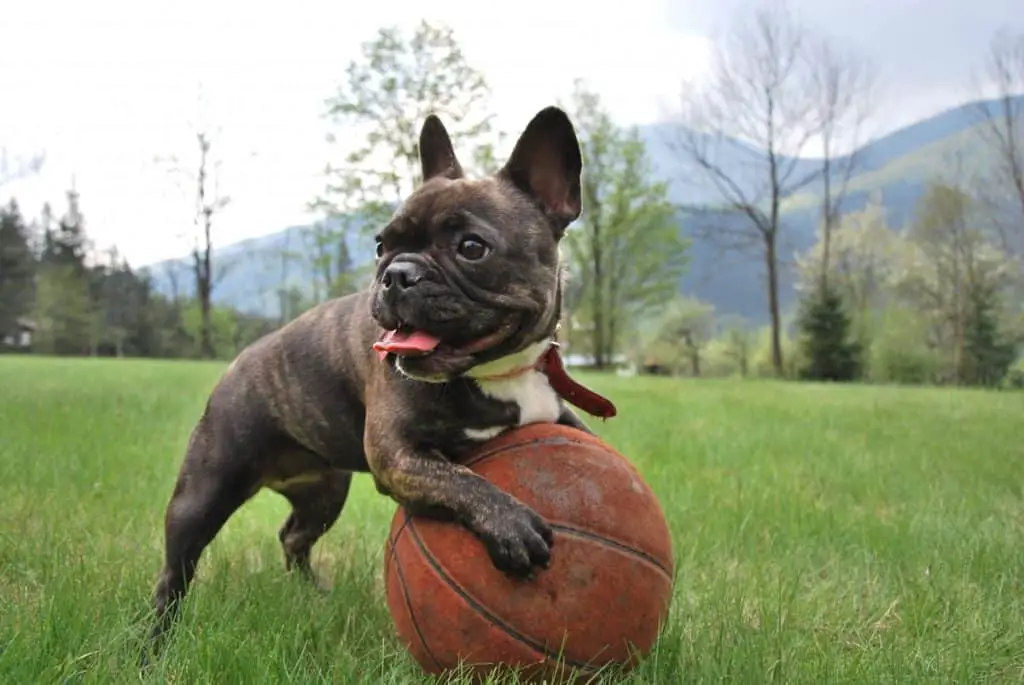
Most French Bulldog owners couldn’t be happier with their adorable pups. This breed is known for its lively and amiable personality, making them the ideal dog.
However, to bring out the best qualities in your dog, you will need to put in dedicated time in order to train them. Some breeds are notoriously difficult to train, while others are painfully easy.
Are French Bulldogs easy to train? This breed is fairly average when it comes to training difficulty. They are known for being a bit stubborn at times, which can make the process difficult, but this is nothing hard work, dedication, and patience can’t overcome.
Of course, it is important to keep in mind that there are no hard and fast rules when it comes to training a specific dog breed. While this article will help you with some general training rules for French Bulldogs, every dog’s needs will vary depending on the individual.
With that being said, let’s dive right in and learn the basics of training your French Bulldog and if they’re easy to train.
Are French Bulldogs Easy to Create Train?
French bulldogs are not known for being easy to crate train, but it is possible with the right plan of action. Make sure you take your time and love on this journey together!
It’s a common misconception that French bulldogs are easy to crate train. Although it may not last long, you need patience and understanding when training your pup in this new habitation for him or her- remember; punishment will only backfire!
What Age Do You Start Training A French Bulldog?
Younger dogs are easier to train!
If you decide to get an older Frenchie puppy (let’s say one that’s over 6 months in age) then I’m sure it won’t be as difficult for your specific situation.
It all depends on the environment they’ve been living and whatnot, but taking home a younger pup at 8 weeks should make things much more manageable since there isn’t any bad habits yet from Territorial Behavior or anything like that which could take longer with time – just give him some love ;).
Training Frenchies can be challenging no matter how old he/she may seem though so keep this into consideration before making such an important decision
How Easy are French Bulldogs To Train Compared to Other Breeds?
While French Bulldogs are closely related to other Bulldogs, they are not classified as working dogs. Working dog breeds are designed to perform specific tasks, and as such, are especially trainable.
French Bulldogs, on the other hand, are classified as toy dogs. These breeds aren’t as easily trained as working dogs, but don’t despair!
When compared to other breeds, the French Bulldog can be considered moderately easy to train. They are quite intelligent dogs, which means you can teach them a variety of things, but they still require a good deal of patience.
Due to their stubborn nature, it will take time to train your Frenchie, but you can rest assured that they are still easier to train than less intelligent breeds.
This breed tends to be a bit more stubborn if they are excited, so be aware that a training session with an excited dog may not turn out as well as you had hoped.
Despite their stubbornness, this dog is also very eager to please their owners. They love feeling accomplished, and they are very devoted little dogs. To encourage positive training results, you should offer a lot of praise.
Are French Bulldogs Easy To Potty Train?
The first step in training your new puppy is always going to be potty training. Despite the French Bulldog’s trademark stubbornness, this is typically the easiest step in training.
This breed is naturally clean and tidy, and they typically take well to potty training, as they prefer to avoid accidents. Furthermore, this is a very intelligent breed, and if they need to use the bathroom, they will typically do their best to communicate that.
Even if your French Bulldog seems to be particularly stubborn, remember that it’s not impossible to potty train your dog! With consistency and dedication, I promise your dog will eventually learn.
An important thing to keep in mind is that French Bulldogs are a small breed. As such, their bladders are especially tiny, which means they will have to go often.
The best course of action is to create a schedule and stick with it. Even if your dog knows to hold their pee, they can only hold it for so long before they have to go!
When setting your schedule, you should keep in mind how frequently your puppy will have to go. According to the ASPCA, puppies can generally hold their pee for around their age in months plus one additional hour.
For example, a puppy that is 3 months old would be able to wait 4 hours before they had to pee again.
If you are worried about your puppy peeing overnight, you should put down some puppy training pads in their bed to avoid any messes. These absorbent pads will make it easy to clean up any accidents, and you’ll be able to avoid doing excessive laundry.
No products found.
Potty training is not a one way street, however. Your dog will hardly be able to speak in order to communicate that they have to use the bathroom. This is where it becomes your job to watch out for signs.
If your dog begins to whine, pace, bark, or even just sit and stare at you expectantly, these could be signs that it’s time to take a potty break. Over time, both you and your dog will be able to develop a sort of language that means it’s time to go.
Of course, this can only happen if you are dedicated and consistent in your training. Routine will become your best friend when you’re training your Frenchie! Using consistent phrases, such as “Let’s go outside,” as well as consistent praise when your dog successfully goes outside, will teach your puppy exactly what to expect every time.
If you find your dog to be especially stubborn with this process, you may even want to incorporate treats at first. Of course, you should eventually wean your dog off of expecting treats every time, as this can lead to health problems such as obesity in the future.
One final thing to remember is not to become upset if your dog has an accident. If you witness your dog peeing in the house, say “no” loudly and firmly, but don’t begin to shout or berate your pup.
If you see that your dog has had an accident but don’t know when the accident occurred, there isn’t really anything you can do. If too much time has passed, your dog will no longer associate any action with their accident, and even a firm “no” will no longer be effective.
All in all, you should remain calm and patient at all times. Even if you feel frustrated with your dog’s process, remember that every pup will learn at a different pace.
Potty training may be difficult at first, but I assure you it won’t last forever!
What to Teach Next
Once your pup has successfully mastered potty training, it’s time to move onto other skills.
While you may be eager to teach your dog a bunch of different commands, you should only ever teach one command at a time. You should establish a routine, where you set aside a specific time each day to train your dog.
Once your dog has learned the routine, and performs well, you can switch to training every other day. Here are some basic commands you should consider teaching:
- Come
- Sit
- Stay
The basic method of teaching these commands is, to begin with, a treat. Show your dog that a treat is ready, and then give the command. For example, say the word “Sit.” If your dog does not sit, then say “no” in a calm but firm voice.
If your dog sits, however, then give your dog the treat and plenty of praise. This will take a long time at first, but if you stick to your routine every single day, your dog will eventually learn what is expected of it.
You should wait until your dog has mastered these basic commands before moving onto other, more complex tasks. Once your dog has successfully learned one command, however, it will likely become much easier to teach your dog other commands in the future.
Above all, you need to remember to be patient and calm at all times. If you find yourself getting frustrated, it’s time to take a step back and calm yourself before continuing. You should never yell at or hit your dog, no matter how frustrated you feel.
How Often Should I Train My Dog?
The ideal frequency for training is twice a day, with one session taking place in the morning and the other taking place in the evening. This can also help if you have a hyper and energetic pup.
However, it is unlikely most people have the time for this, so if you are unable to train your dog twice a day, once a day is acceptable.
You should only train your dog every other day, however, once your routine has been well established, and your dog is doing well with the commands you have provided.
Even if your dog has learned every command you intend to teach it, however, that does not mean you should stop training. Commands will be quickly unlearned if you stop training, so you should at least have a session once a week in order to maintain these commands.
The most important thing to remember is that you have to be consistent with your schedule. If you throw off your dog’s routine, it’s pattern recognition will be thrown off, and it will have a very difficult time learning what you expect of it.
Keep your expectations consistent. Remember, your dog cannot read your mind!
Obedience Training
If you do not have the time or patience to properly train your dog, or if you find that your dog seems just a bit too stubborn for you, it is also possible to hire a professional dog trainer.
While this is a pricey route to take, it can be well worth it in the end. An untrained dog is simply not as easy to live with.
Before selecting a trainer, however, you should do plenty of research into their credentials. You should never hire a trainer without first looking at the kennels and conditions of where your dog will be kept while it is being trained.
If you have a special needs dog, however, a trainer might not be the best option, as they may not be as well equipped to handle a medical emergency.
Final Thoughts
Many first-time dog owners find the task of training to be daunting, but with dedication and patience, even the most stubborn of French Bulldogs can be trained!
Training is a vital part of owning a dog, and it will help to strengthen your bond, as well. Though time-consuming, training is well worth all of your efforts in the end, and it will result in a much happier relationship between you and your dog.
Also introducing some toys into your training regime may help here a guide I’ve put together Click Here
Last update on 2024-07-17 / Affiliate links / Images from Amazon Product Advertising API

